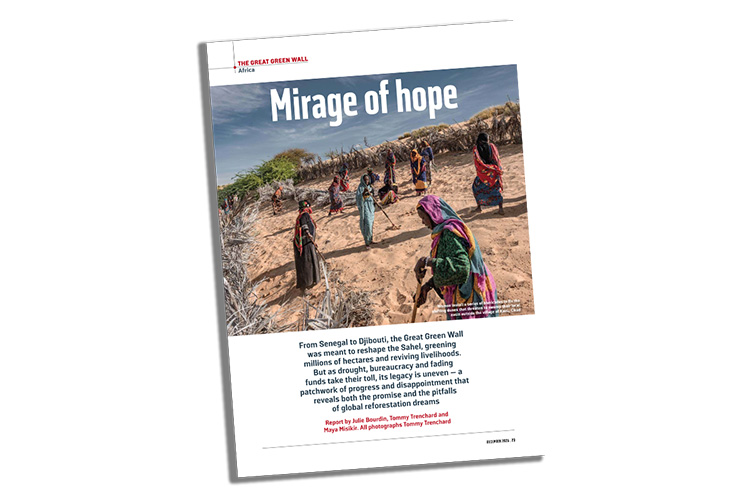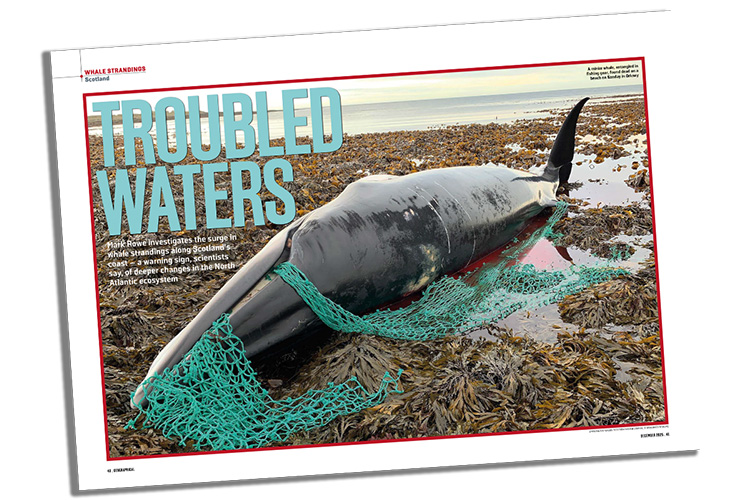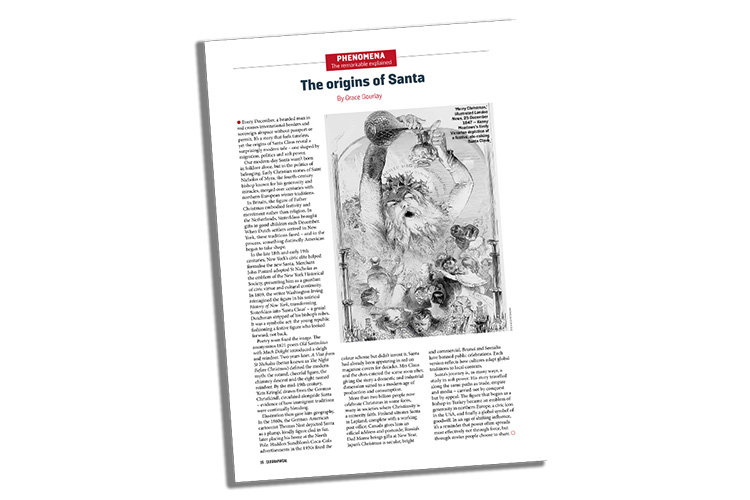
From Africa’s boldest environmental dream to Scotland’s troubled waters, stay on top of the world with the latest issue of Geographical
In our December issue, we head to Greenland, where the island’s ice sheet is losing a staggering 30 million tonnes of ice every hour of every day – resulting in a scramble for resources. Also in this issue: we investigate the surge in whale strandings along Scotland’s coast; search for bears in a mountainous wilderness that could be Europe’s answer to Yellowstone; and showcase the photographs of explorer, conservationist and author Shem Compion, who has spent two decades capturing life in the Rift Valley.
This month’s cover story takes us to the Sahel, where a multi-billion dollar, 100-million-hectare-spanning land restoration project launched in 2007 was meant to solve the region’s problems: hunger, conflict and migration. Instead, the Great Green Wall has fallen drastically short of its targets.
Our columnists bring an array of topics to the forefront to help you stay on top of the world: Marco Magrini argues that a better quality of life now, not future promises, drives the public to demand climate action; Tim Marshall reflects on the latest US intervention in Latin America; and James Rose reveals how control over crops, not crude oil, may decide who holds power in a warming world.
Our digital edition is out now too, giving you access to all the stories in our latest issue, as well as our full archive dating back to 1935, with hundreds of magazines to explore. Digital access is available through the Geographical app, and you can now enable notifications to be alerted the moment the latest issue is live. And if you want to enjoy our beautifully designed and produced print magazine, we can post the next edition to you anywhere in the world. Join us and stay on top of the world!
A crumbling, country-spanning wall

The Great Green Wall – an ambitious African Union plan launched in 2007 – is failing to deliver. Envisioned as a 7,000-kilometre belt of trees stretching across the Sahel from coast to coast, its goal was to restore 100 million hectares of degraded land. Despite requiring billions of dollars in pledged international investment, the project is massively behind schedule, achieving just a fraction of its land restoration target. Its grand scale has been undermined by poor design: the initial focus on simply planting a rigid ‘wall of trees’ has led to high failure rates for non-native plant species. Furthermore, widespread political instability and conflict across the Sahel, combined with a lack of local community involvement, has stalled progress and left the world’s most massive anti-desertification project facing collapse. Can the project pivot from a crumbling wall to a sustainable mosaic landscape? Read the full report to find out.
The crisis on Scotland’s coasts

Scotland’s shores are becoming the site of a tragic and increasing phenomenon: mass whale and dolphin strandings. The rate of these fatal incidents has seen an exponential surge in recent years, particularly affecting species like baleen whales (including minke and humpback whales) and common dolphins. In the last decade alone, experts have recorded sharp increases, raising the alarm that these animals are acting as ‘sentinels of the ocean’ – a visible warning sign that their habitat is in distress. Mark Rowe heads to Orkney to investigate the potential causes.
An island on thin ice

Greenland is rapidly transitioning from a remote Arctic outpost to a geopolitical hotspot. Climate change is the main driver: the massive ice sheet – the second largest on Earth – is melting at an accelerating rate, contributing to about a millimetre of global sea-level rise every three years. This environmental disaster is simultaneously creating a commercial and military opportunity. The melting ice is exposing vast, untapped natural resources beneath the bedrock, including rich deposits of rare earth elements – essential for high-tech and green energy industries – alongside oil, gas, and uranium. Stuart Butler takes a hike, and a kayak, across the ice to report on how the world’s largest island is changing, and what that means for us all.
The complicated literary legacy of VS Naipaul

VS Naipaul (1932–2018) remains one of the 20th century’s most brilliant – and most controversial – literary figures. Born in Trinidad to a family of Indian descent, the Nobel Laureate’s work grappled with the pain and cultural confusion of post-colonial life, migration, and identity. This profile of the highly-admired, sometimes feared, author is the latest instalment in our series on influential writers and the works that defined them.
The making of a modern myth

Few cultural figures are as universally recognisable, or as commercially influential, as Father Christmas – or ‘Santa Claus’. Far from being a modern invention, this global phenomenon is a complex blend of history, folklore, and strategic marketing, originating thousands of miles from the North Pole.




